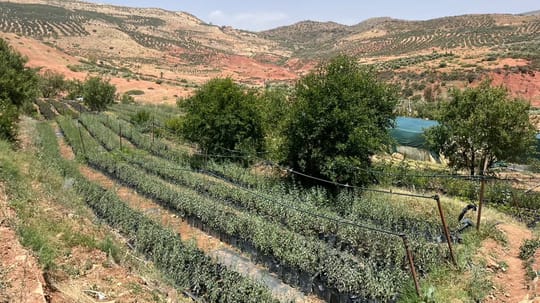By Pommelien da Silva Cosme, HAF intern
December 11, 2015
Last week, I was thrilled to attend a compost workshop in Ourika Valley, just 45 minutes out of Marrakech. Eager to learn more about the process and the benefits of composting, I joined some 30 women to learn more about the basic guidelines on how to start building a compost.
We quickly learned the key to a successful compost is “diversity” — the more diverse the products, the more diversity in the waste, the better your compost will be. When Martin, the young man leading our workshop, asked the women which waste they had collected for the workshop, it took no time before there was a large pile of scraps in front of us. And it was certainly diverse!
Martin made all of us laugh when he compared making compost to making couscous. While stressing diversity, we discussed our ingredients of the day: wood, dry gras, herbs, hay, vegetable waste, chicken manure, goat manure, and, of course, water.
The women seemed to really enjoy the day and were not hesitant to get their hands dirty. Everyone was happy to help build the compost– even the little kids. There were women taking notes, asking questions, cutting grass, and breaking wood. It turned out to be a very productive, informative, and inspiring day. To see so many women engaged, interested, and actively concerned by the environment was very motivating.
The use of compost is also very important in the fight against global warming. All life is made up of carbon, including all soil life. When you add compost (which also contains a lot of carbon) to the bottom, you stimulate the soil life which expands enormously. This living soil contains a lot of fixed carbon, but also the dead soil holds carbon in the soil. Which basically means this: the more carbon in the soil, the less in the air in the form of CO2.
There is a lot potential in composting and the process could be interesting for many different reasons. Most importantly, composting benefits the environment. By recycling organic resources we are able to reduce our organic waste at the same time.
There are many benefits to composting:
– It increases the organic matter in your soil
– It helps absorb nutrients in the soil
– It regulates the soil’s pH
– It helps sandy soils retain water that would normally run through
Bottom line: composting turns your waste into a useful product. When the compost is mature it will help plants to grow. It will also reduce the need for water and fertilizers and helps eliminate the need for pesticides.
My greatest lesson of the day: composting is nature’s way of recycling and we should all consider to start doing it! What all of this will add up to is a healthier soil, beautiful gardens and above all a sustainable way to reduce your organic waste.
